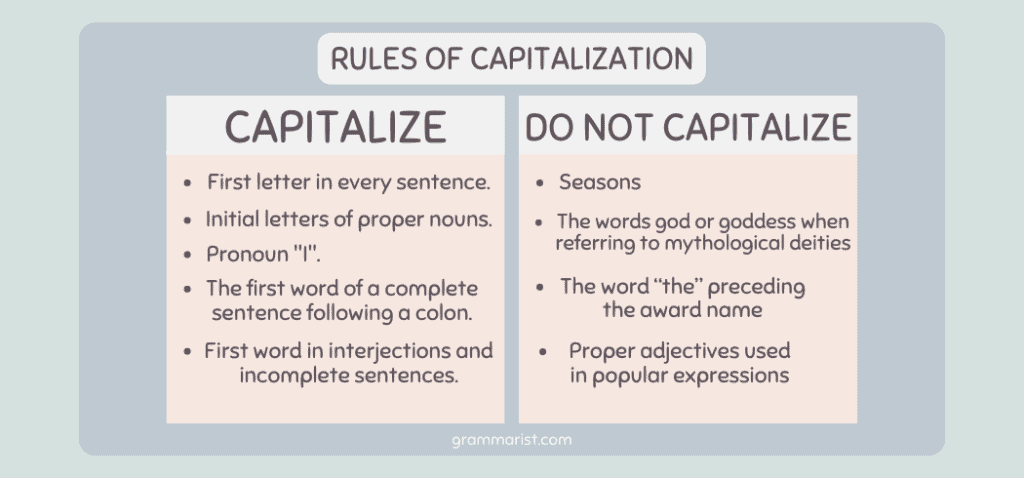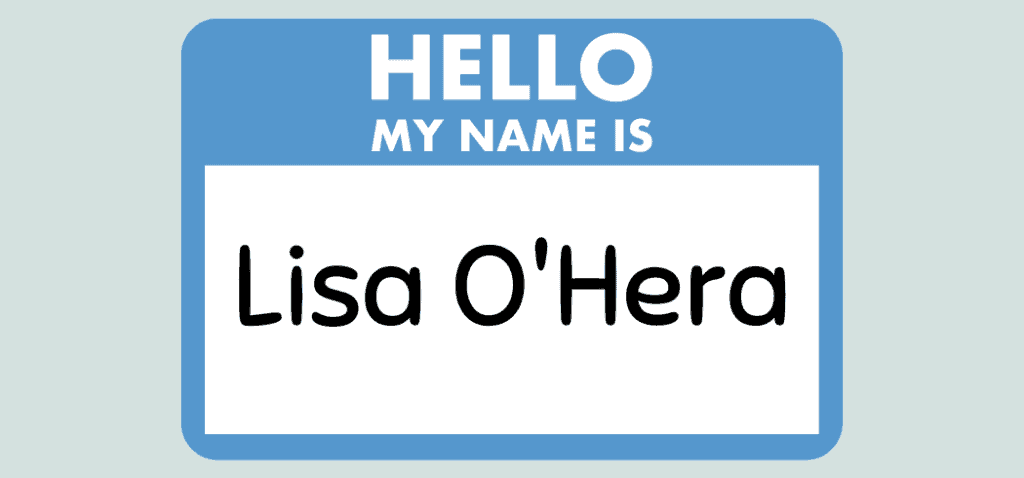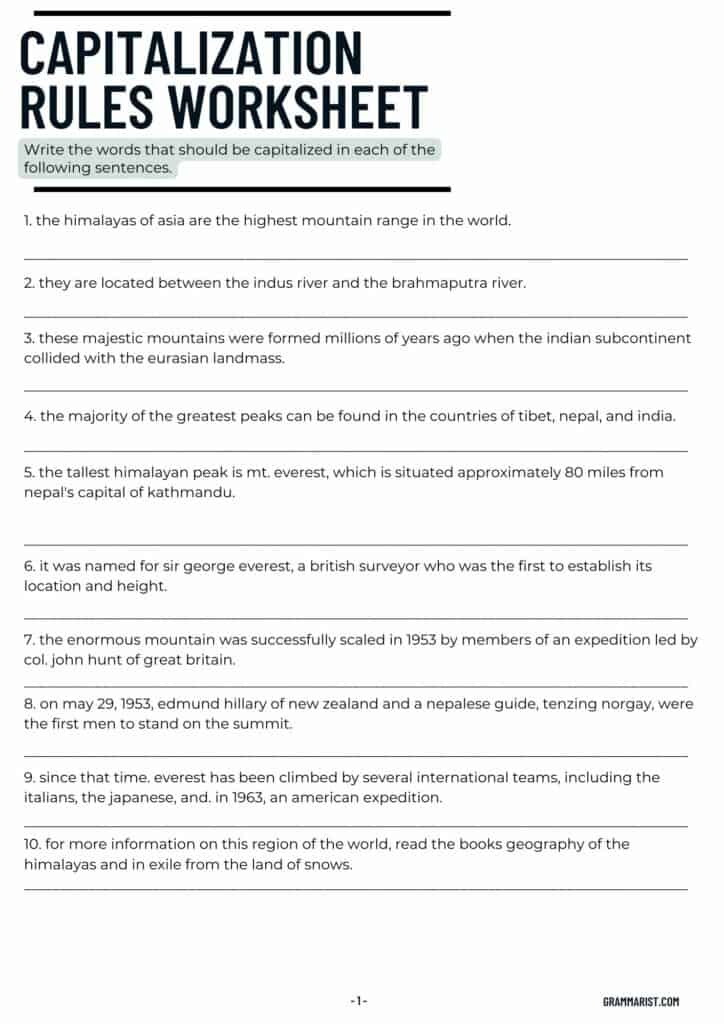In all my years of teaching grammar and conventions, the simplest rules seem to be the hardest for many students to remember.
As surprising as it is, the elementary lesson of capitalization use is often the most elusive – and these basic errors create confusing sentences. The writing also ends up looking incomplete and it is difficult for future employers to take anyone seriously when basic grammar is ignored.
Let’s review the rules of capitalization to help you remember how they should be applied so your writing is clear, concise, and understandable.
What are the Rules of Capitalization?

You were most likely first introduced to the rules of capitalization in early elementary school. Capitalization serves an important role in writing to indicate important words and signal new thoughts.
For capitalization in English, there are three common rules on which everyone can agree:
- Capitalize the first letter in every sentence.
- Capitalize initial letters of proper nouns.
- Capitalize the pronoun I.
But, there are many rules governing the use of capitalization, and we are going to review the most widely accepted rules below.
Using Capitals for First Words
The most widely used and recognized rule of capital letters is to capitalize the first word of a sentence. They serve as a visual clue to the reader by making certain words stand out more prominently on a page.
Capital letters signal the start of a new idea in a sentence.
First Word Rule #1: Sentences
Capitalize the first word in declarative, interrogative, imperative, and exclamatory sentences.
For example:
- Sarah visited the beach while on vacation.
- Did you pick up the groceries?
- Put that book away.
- I can’t believe I was awarded the scholarship!
First Word Rule #2: Sentences
Capitalize the first word in interjections and incomplete sentences.
For example:
- Darn! Wow!
- When? How?
First Word Rule #3: Sentences
Capitalize the first word of a complete sentence following a colon. If a list or dependent clause or phrase follows a colon, it is not a complete sentence and, therefore, no capital letter is used.
For example:
- Consider a note about this rule: It is sometimes more acceptable to use a semi-colon instead of a colon if the following sentence is a complete sentence (see what I did there?).
First Word Rule #4: Quotations
Capitalize the first word in the quotation at the quotation is a complete sentence.
For example:
- I always loved the picture Muir paints with his words when he wrote, “In every walk with nature one receives far more than he seeks.”
First Word Rule #5: Poetry
Capitalize the first word in each line of most poetry even if the line does not begin a new sentence.
For example:
Water falling
I watched it stream
Gently down to earth
First Word Rule #6: I and O
Capitalize I and O through a sentence.
For example:
- She wasn’t sure when the paper was due, but I knew it had to be done before Friday.
- She looked up, surprised, her mouth a round O as she stood, speechless.
Using Capitals for Proper Nouns

Proper nouns are nouns that name a specific person, place, or thing. They must be capitalized to properly indicate their importance to a sentence.
Proper Noun Rule #1: Names
Capitalize all proper nouns, including each part of a person’s name.
The given first, middle, and surname (last name) of a person must be capitalized, as do initials.
For example:
- Sanna L. Hamilton
- Lisa O’Hera
- Michael St. John
Capitalization beginning with la, le, de, Mac, van, von, or D’ may vary depending on the family spelling and preference of the name.
For example:
- De Ville vs. de Ville
Proper Noun Rule #2: Animals
Capitalize the proper names of animals.
For example:
- Hazel Fuzzy Butt
- Ginger the Wonder Dog
- Wrigley the Weasel
Proper Noun Rule #3: Geography
Capitalized geographical names.
Street names, towns, cities, counties, states, provinces, countries, continents, valleys, mountains, rivers, and oceans are all capitalized. If it can be found on a map, capitalize it.
For example:
- South America
- Galapagos Islands
- Boston
- Lea County
Compass points are only capitalized if they are referring to a specific location.
For example:
- We were driving southwest on the highway.
- We were driving through the South to reach our destination on the East Coast.
Proper Noun Rule #4: Places
Capitalize the names of monuments, buildings, and meeting rooms or classrooms
For example:
- Lincoln Memorial
- Joe Louis Arena
- Room 212
Proper Noun Rule #5: Events and Periods of Time
Capitalize the names of specific events, such as historic periods, events, documents, days and months, holidays, and special events.
For example:
- Middle Ages
- Civil War
- Homestead Act
- Saturday
- June
- Memorial Day
- Christmas
- Belmont Stakes
Proper Noun Rule #6: Seasons
Do not capitalize the seasons.
For example:
- We could tell spring was on the way due to the warm breeze.
Proper Noun Rule #7: Organizations, Nationalities, Languages
Capitalize the names of various organizations, businesses, government bodies, political parties, nationalities, and languages.
For example:
- Debate Club
- United Farm Workers
- University of Michigan
- BioCorps, Inc.
- Department of Defense
- Republicans, Libertarians
- American, Brazilian, Hispanic, Italian
- English, Spanish, Portuguese
Proper Noun Rule #8: Religion
Capitalize references to religions, deities, religious figures, holy books, and religious sculptures.
For example:
- God
- Allah
- Lord
- Holy Spirit
- Bible
- Torah
- Islam
- Buddhism
- Prophets
Do not capitalize the words god or goddess when referring to mythological deities, but do capitalize their proper names.
For example:
- Our studies on Greek and Roman gods and goddesses was very interesting.
Proper Noun Rule #9: Awards
Capitalize the names of awards. Do not capitalize the word “the” preceding the award name.
For example:
- the Nobel Peace Prize
- the Oscars
- the Pulitzer Prize
Proper Noun Rule #10: Vehicles
Capitalize the names of specific types of air, space, and land craft.
- Boeing 747
- Sputnik
- Camaro
- USS Alabama
Using Capitals for Proper Adjectives

Proper adjectives are proper nouns used as an adjective, or are formed from a proper noun.
Proper Adjective Rule #1
Capitalize most proper adjectives.
For example:
- American people
- French government
- Gothic style
Proper adjectives used in popular expressions are not capitalized.
For example:
- venetian blinds
- french fries
Proper Adjective Rule #2
Capitalize brand names used as adjectives.
For example:
- Hercules luggage
Proper Adjective Rule #3
Do not capitalize prefixes attached to proper adjectives unless the prefix refers to a nationality.
For example:
- pre-Renaissance architecture
- Indo-China
USe Adjective Rule #4
In a hyphenated adjective, capitalize only the proper adjective.
For example:
- Italian-speaking Americans
Using Capitals for Titles
Title Rule #1: People
Capitalize a person’s title when it is used with the person’s name or when it’s used in direct address in place of a person’s name.
For example:
- Major Johnson reviewed the reports and gave a nod of approval.
- The Major’s approval allowed us to get started with the next step.
Do not capitalize if used as a general reference.
For example:
- The reports required the approval of a higher official, such as a major.
Title Rule #2: People
Capitalize titles of government officials when they are followed by a proper name or used in direct address.
For example:
- Senator Davis met with the people before elections began.
- Will you be meeting us at a specific time, Senator?
Do not capitalize if used as a general reference.
For example:
- It would be nice if all senators were willing to meet with their constituents.
Title Rule #3: People
Capitalize titles of certain high government officials if they refer to the incumbent even when the titles are not followed by proper name or used in direct address.
For example:
- The President traveled to the hurricane affected areas.
- The King of England was sworn in recently.
- The trail will be taken on by the Supreme Court.
Title Rule #4: People
Capitalize the important words in the compound titles, but not prefixes and suffixes added to the title.
For example:
- ex-Senator Smith
- Lieutenant Governor
Title Rule #5: People
Capitalize titles showing family relationships when they refer to a specific person unless they are preceded by a possessive noun or pronoun.
For example:
- My Aunt Mary lived to be 93 years old.
- Sarah’s aunt was as spry as ever in her old age.
Title Rule #6: People
Capitalize abbreviations of titles before and after names.
For example:
- Mr. Smith
- Mrs. Davis
- Ms. Johnson
- Mr. Johnathon Smith, Sr.
- Mr. Jonathan Smith, Jr.
Title Rule #7: Titles of Written Works and Art
Capitalize the first word and all other key words in the titles of books, periodicals, poems, stories, plays, paintings, and other works of art.
For example:
- Little Women
- Reader’s Digest
- The Phantom of the Opera
Title Rule #8: Titles of Courses
Capitalize titles of courses when the courses are language courses or when the courses are followed by a number.
For example:
- Sociology 101
- Spanish
- New Mexico History 2B
Other Points to Remember
In modern writing, there are simultaneous trends toward and away from capitalization. The trend in informal writing and much journalistic writing is away from it. Meanwhile, there is an unfortunate trend in business, corporate, and marketing writing to capitalize words for emphasis or to give words a little extra heft.
But if you use instant messaging, text messaging, email, or social networking, you’ve probably noticed that many people don’t capitalize at all in these mediums.
Regardless of what writers do in business and marketing (where trying to enforce good writing is a lost cause), the best rule of thumb for capitalization is to err on the side of minimalism. Follow the rules listed above, avoid capitalizing common nouns just because other people do, avoid capitalization for emphasis (that’s what italicization is for), and never use all caps (LIKE THIS). Beyond those guidelines, here are a few other points:
- Different publications have different standards for capitalizing titles and headings. Use what looks best to you.
- Complete sentences within sentences should be capitalized. This includes quoted sentences (e.g., She said, “How are you?”) and complete sentences following colons (e.g. One thing’s for sure: You’ll get your money’s worth).
- In abbreviations, capitalize letters that stand for capitalized words (e.g., USMC for United States Marine Corp, BoA for Bank of America).
- Some great 19th-century poets had a habit of capitalizing abstract and personified nouns such as Nature and Love, but that doesn’t make it a good idea in general.
Let’s Review
There are many instances in which you will use a capitalization, but all mainly follow the three common rules: capitalize the first letter of every sentence, the initial letter of proper nouns, and the pronoun “I”.
If you can remember this, then it is easier to apply them to the scenarios in which a capital letter is required.
Use the above guidelines for capitalization to answer any questions you may have and help make corrections to your own writing.


Comments are closed.